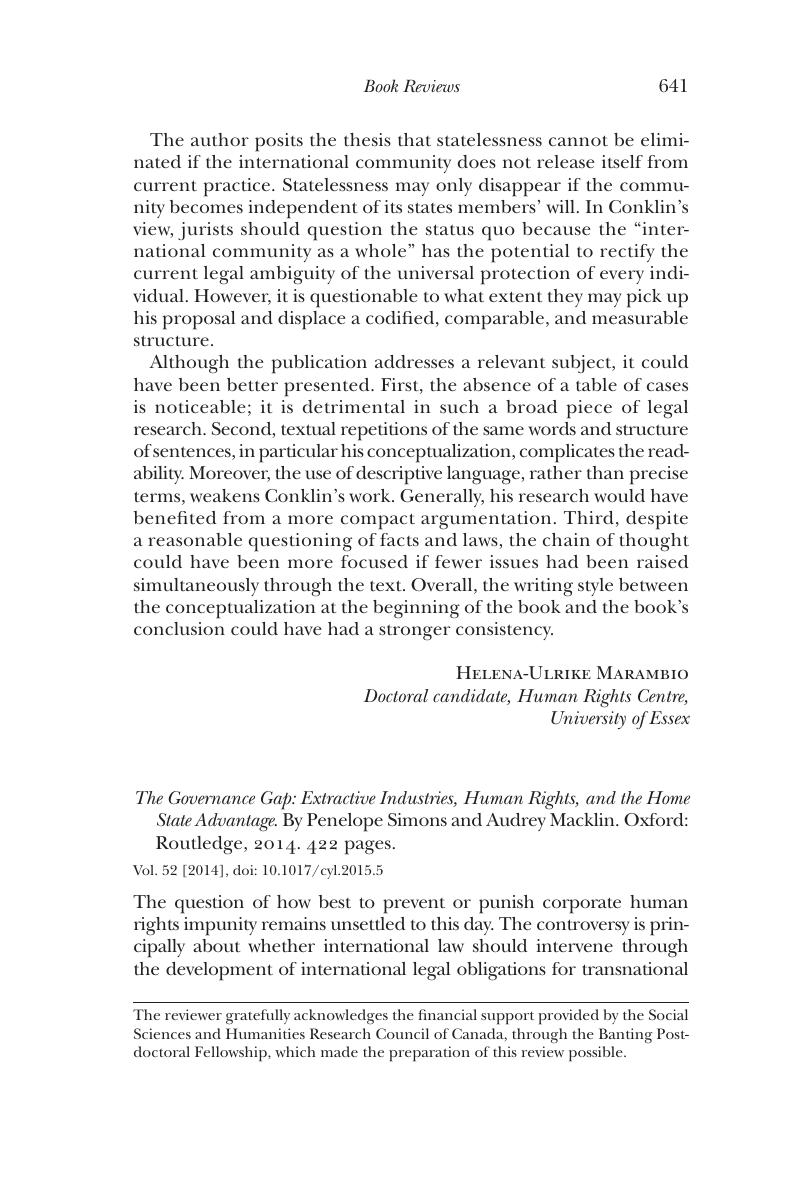No CrossRef data available.
Article contents
The Governance Gap: Extractive Industries, Human Rights, and the Home State Advantage. By Penelope Simons and Audrey Macklin. Oxford: Routledge, 2014. 422 pages.
Published online by Cambridge University Press: 17 November 2015
Abstract

- Type
- Book Reviews / Recensions de livres
- Information
- Canadian Yearbook of International Law/Annuaire canadien de droit international , Volume 52 , October 2015 , pp. 641 - 648
- Copyright
- Copyright © The Canadian Yearbook of International Law/Annuaire canadien de droit international 2015
References
1 Organization for Economic Cooperation and Development (OECD), OECD Risk Awareness Tool for Multinational Enterprises in Weak Governance Zones, online: OECD <http://www.oecd.org/>.
2 The term “new governance” first appeared in a 1996 article; see RAW Rhodes, “The New Governance: Governing without Government” (1996) 44:4 Political Studies 652. The scholarship argues for a flexible, collaborative, and experimental approach, which combines both public and private regulation, as well as voluntary and mandatory mechanisms, to the regulation of corporate behaviour. See Karen Bradshaw Shulz, “New Governance and Industry Culture” (2013) 88 Notre Dame L Rev 2515.
3 See the Foreign Assistance Act, 11 USC § 2191b (1961); Export Development Act, RSC 1985, c E-20.
4 See Special Economic Measures Act, SC 1992, c 17.
5 See Crimes against Humanity and War Crimes Act, SC 2000, c 24.
6 See Foreign Corrupt Practices Act, 15 USC § 78dd (1977); Dodd-Frank Wall Street Reform and Consumer Protection Act, Pub L No 111-203, § 1502, 124 Stat 1376 (2010) [Dodd-Frank Act]; Corruption of Foreign Public Officials Act, SC 1998, c 34.
7 See Competition and Consumer Act 2010 (Cth), Sch 2.
8 See Dodd-Frank Act, supra note 6; Public Interest Disclosure Act 1998 (UK), c 23.
9 For a detailed analysis of the doctrine’s nature and scope of application, see Chilenye Nwapi, “A Necessary Look at Necessity Jurisdiction” (2014) 47:1 UBC L Rev 211. For an analysis of the doctrine’s potential application to the regulation of the transnational corporate actor, see Chilenye Nwapi, “Jurisdiction by Necessity and the Regulation of the Transnational Corporate Actor” (2014) 30:78 Utrecht J Intl & European L 24.
10 See Chilenye Nwapi, “Re-Evaluating the Doctrine of Forum Non Conveniens in Canada” (2013) 34 Windsor Rev Legal Soc Issues 59.




